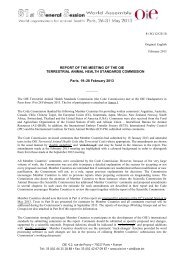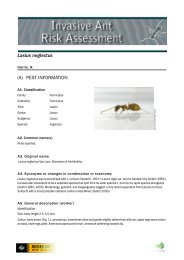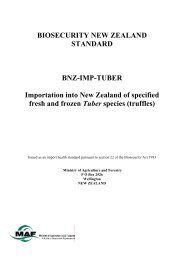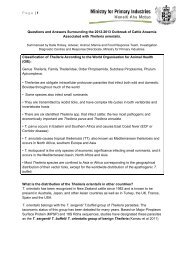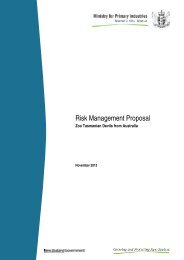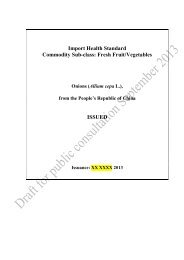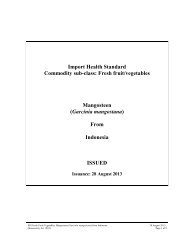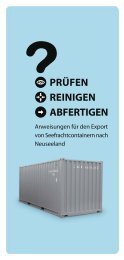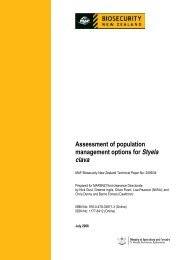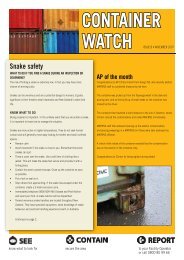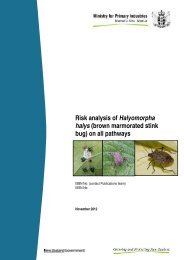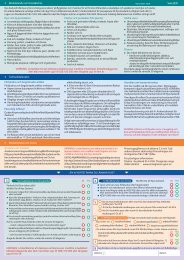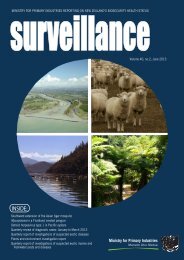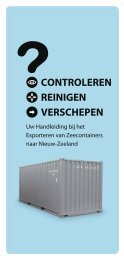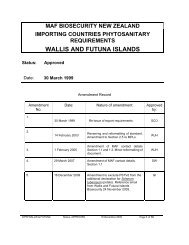Import risk analysis: Llamas (Lama glama) and alpacas (Vicugna ...
Import risk analysis: Llamas (Lama glama) and alpacas (Vicugna ...
Import risk analysis: Llamas (Lama glama) and alpacas (Vicugna ...
You also want an ePaper? Increase the reach of your titles
YUMPU automatically turns print PDFs into web optimized ePapers that Google loves.
edding materials include wood shavings, sawdust or sterilised peat. During the 30<br />
days in quarantine the plant material eaten by the animals before they were<br />
introduced into the quarantine facilities, will have been either digested or passed<br />
out in the faeces. Regular removal of faeces <strong>and</strong> soiled bedding will reduce the<br />
likelihood that weed seeds will be present in faeces that could contaminate animal<br />
coats.<br />
� Feeding of processed pellets that are essentially free of weed seeds could ensure<br />
that the animals do not ingest new burdens of weed seeds. Heat treatment used in<br />
the production of pellets will reduce the number of viable seeds.<br />
� There is nothing in the Code relating to hitch hiker weeds <strong>and</strong> plants associated<br />
with animals.<br />
One or a combination of the following measures could be considered in order to effectively<br />
manage the <strong>risk</strong>s.<br />
1. Animals that are presented for loading could be required to be short shorn <strong>and</strong> well<br />
groomed <strong>and</strong> free from any visible weeds, seeds or plant material.<br />
2. To ensure minimal <strong>risk</strong> of introducing weed species of concern to New Zeal<strong>and</strong>,<br />
animals could be held, pre-shipment, in areas free of weed species <strong>and</strong> fed on clean<br />
pasture or high quality feed. During transport, provision of high quality feed with<br />
little or or no weed species contamination or feed that has been treated in such a<br />
way as to render seeds non-viable will mitigate the <strong>risk</strong>s associated with the<br />
importation of live animals. Dung produced during transport should be safely<br />
disposed of, either enroute or on arrival in New Zeal<strong>and</strong>.<br />
N.B. This reflects the <strong>risk</strong> management section of the weed seeds import <strong>risk</strong> <strong>analysis</strong><br />
(MAF 1999).<br />
3. Animals could be fed a high quality, seed-free diet to speed passage time in the<br />
digestive tract, for at least 10 days prior to their arrival in New Zeal<strong>and</strong>.<br />
N.B. There may be deleterious health effects of such a diet in llamas <strong>and</strong> <strong>alpacas</strong>. They do<br />
not do well on pelleted rations <strong>and</strong> may lose weight <strong>and</strong> develop diarrhoea.<br />
4. Measures suggested in the Tick section for the management of <strong>risk</strong> associated with<br />
ticks could also be considered for the control of weeds, seeds, <strong>and</strong> plant material.<br />
References<br />
Barton K, Williams PA (2001). Passage time for weed seeds in the digestive tract of herbivorous livestock.<br />
L<strong>and</strong>care Research Contract Report: LC 0001/065.<br />
Encyclopædia Britannica (2008). Dormancy <strong>and</strong> life-span of seeds. Encyclopædia Britannica Online.<br />
Available at: http://britannica.com/eb/article-75927, downloaded 8/1/2008<br />
Katovich J, Becker R, Doll J (undated). Weed seed survival in livestock systems. A publication of University<br />
of Minnesota extension service. Available at: http://www.manure.umn.edu/assets/WeedSeedSurvival.pdf,<br />
downloaded 27/8/2009.<br />
MAF Biosecurity New Zeal<strong>and</strong> <strong>Import</strong> <strong>risk</strong> <strong>analysis</strong>: <strong>Llamas</strong> <strong>and</strong> <strong>alpacas</strong> from specified countries ● 151



